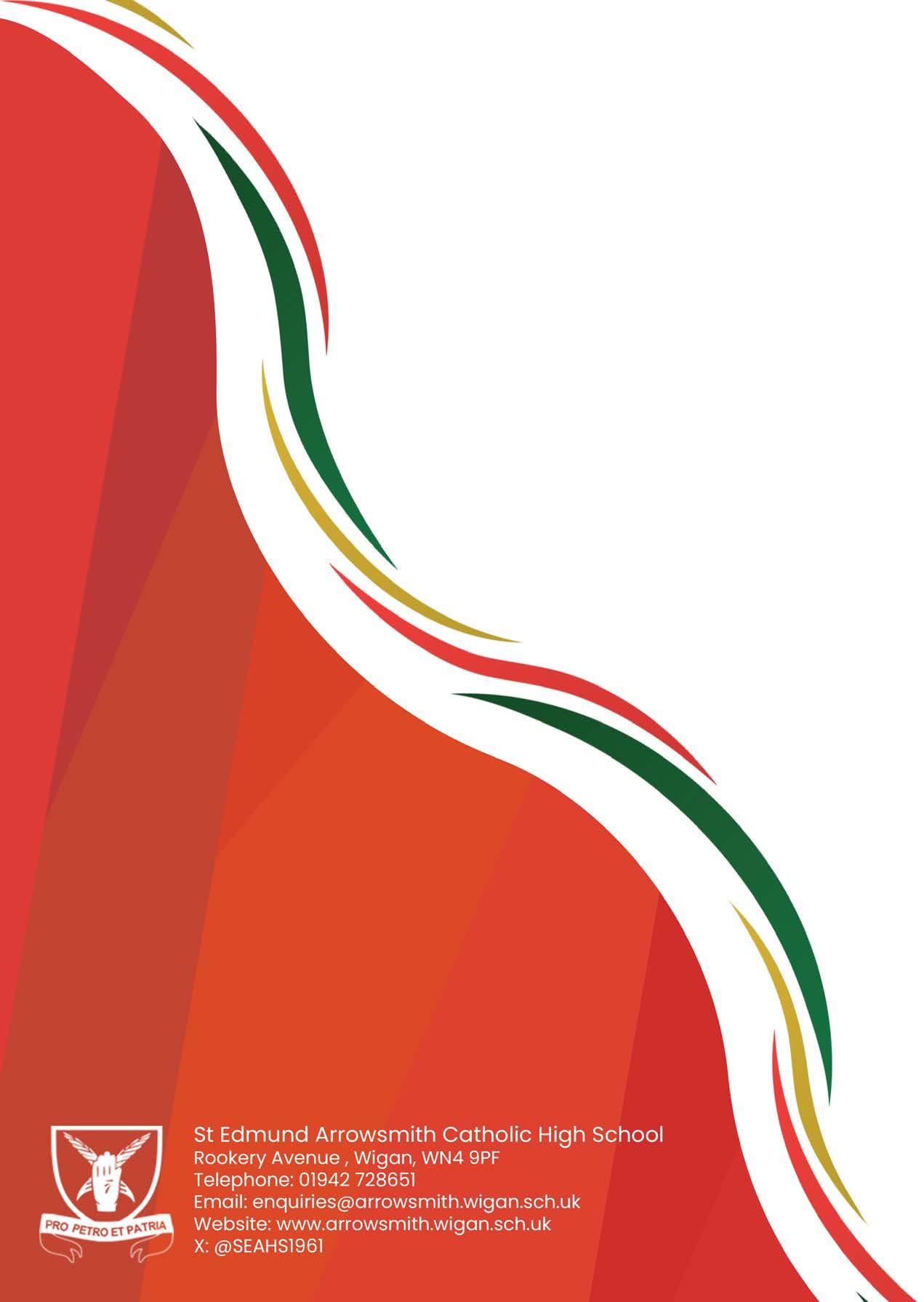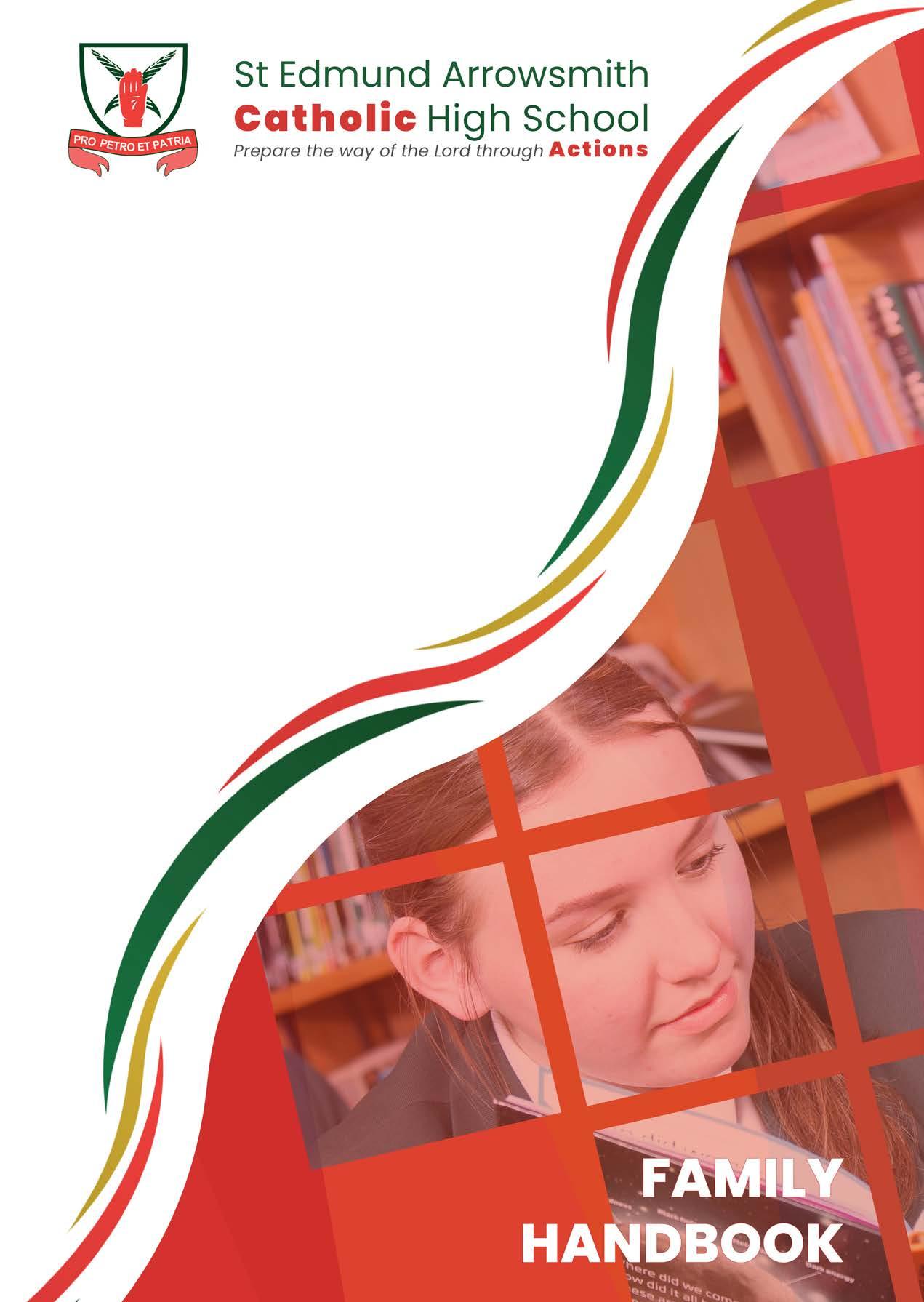
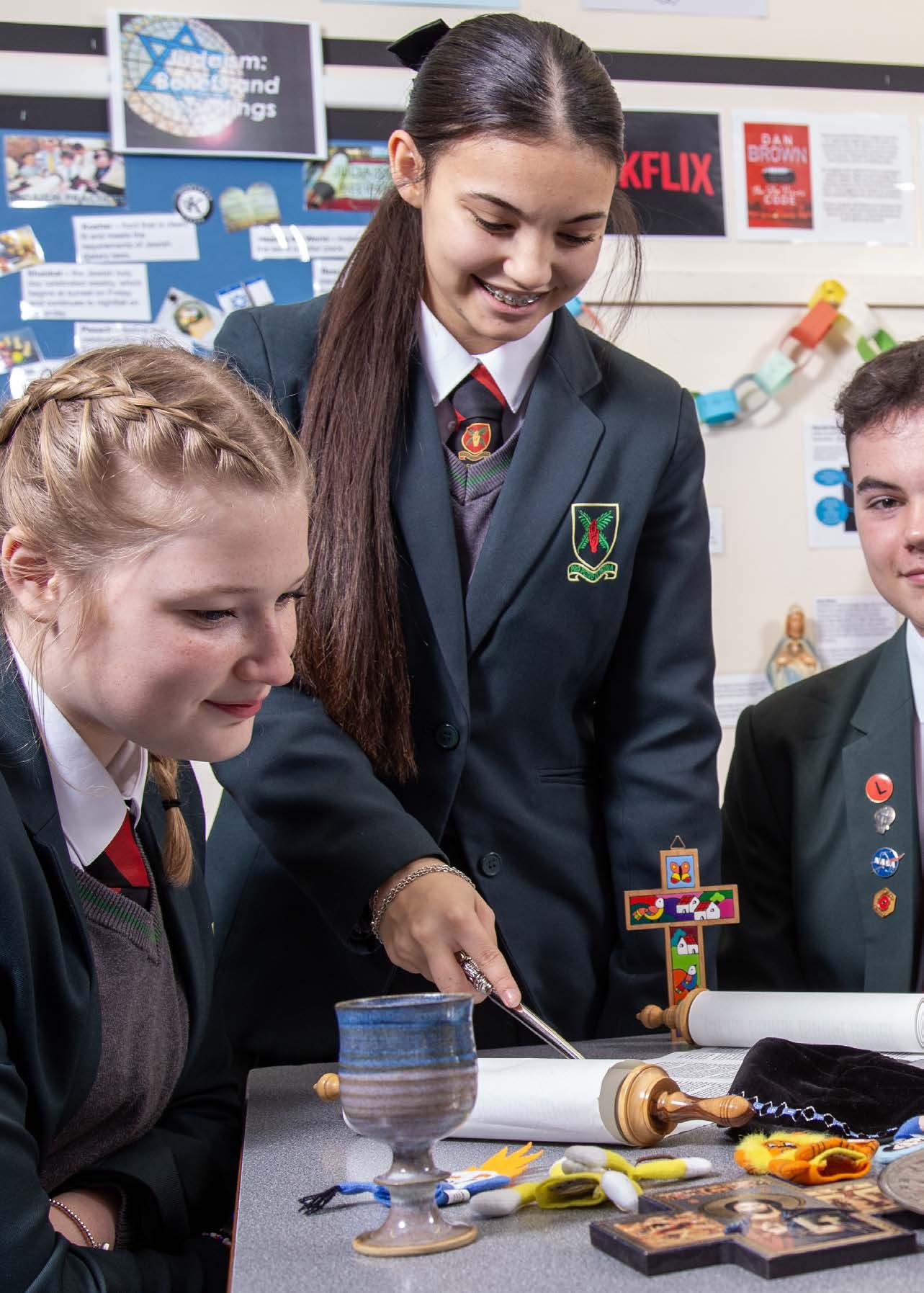
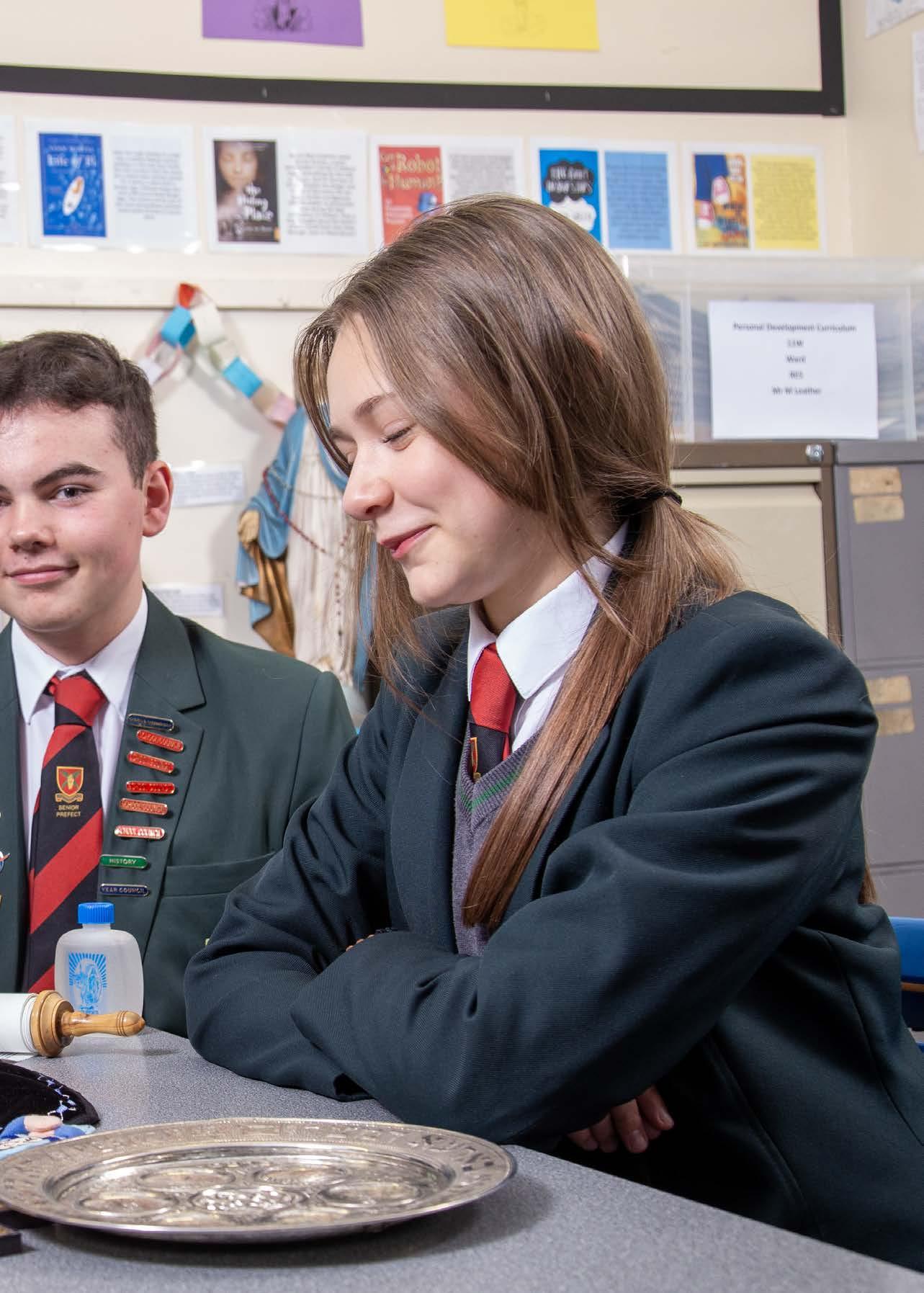





This Family Handbook is intended to provide some general information about St Edmund Arrowsmith Catholic high school and to outline ways we will work together to support your child during their time here. We believe that your role in this will be vital.
St Edmund Arrowsmith Catholic High School continues to provide an outstanding Catholic Education for the children of Ashton and the surrounding area. Our Catholic faith is central to everything we do, and our pupils are asked to be living witnesses to that faith and develop the values that come with it. We reveal who we are in the hundreds of mundane everyday interactions in our school community: opening doors for each other, being polite and courteous along the corridors, taking care of each other and offering help when needed. Our mission statement ‘Prepare the Way of the Lord through ACTIONS’ clearly sets out our aspirations for excellence in all that we do.
All pupils are set aspirational performance levels and target grades, and we will tell you more about these at our Guidance Evening events in the first term. We have ongoing ‘learning checks’ which take place across all subjects throughout the year and 2 Formal Summative Assessment points at the end of the first and third terms in every subject to monitor your child’s progress against their targets.
Should your child’s performance fall below these targets, their teachers, Director of Learning and Form Tutor will work hard to get them back on track and enlist your support in this process.
Pastoral support
We pride ourselves on the individualised care we provide for pupils at St Edmund Arrowsmith,
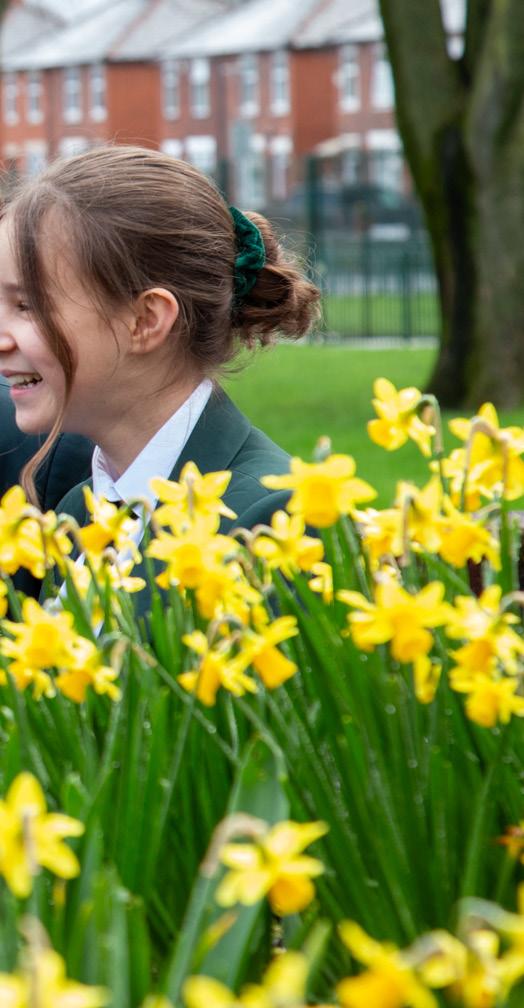
us is, in many ways, is a transitional stage from school to further/higher education and employment. We know that not all pupils find the move to High School an easy one and we run a thorough induction programme to help provide reassurance and settle them into school life.
A number of older pupils act as mentors/buddy’s to Y7s, for whom a friendly face and sympathetic ear may be particularly welcome.
We have an Arbor parents’ app for our whole school information system where you will find the latest information about your child’s day to day achievements in school along with any communications about your child. It also provides an opportunity for you to give us feedback about your child’s experience at St Edmund Arrowsmith.
In this Family Handbook, you will find a range of information about the life of our school. We encourage parents’ interest and involvement in school life and the experience of their child in school. We aim to foster a partnership with you and your child and their teachers and Form Tutor. Your values are our values and by working together we will ensure your child has the best possible experience at St Edmund Arrowsmith.
We are committed to continuous review and improvement in all aspects of our work, and the views of parents/carers are a valued element of this process. I would recommend that if you
ever have any concerns, queries or questions, please arrange to meet the appropriate staff member and you will be sure to find a warm and courteous welcome.
I look forward to meeting you in person at some point in the near future, but in the meantime, I send my best wishes to you and your family.

Mr M J Dumican Headteacher
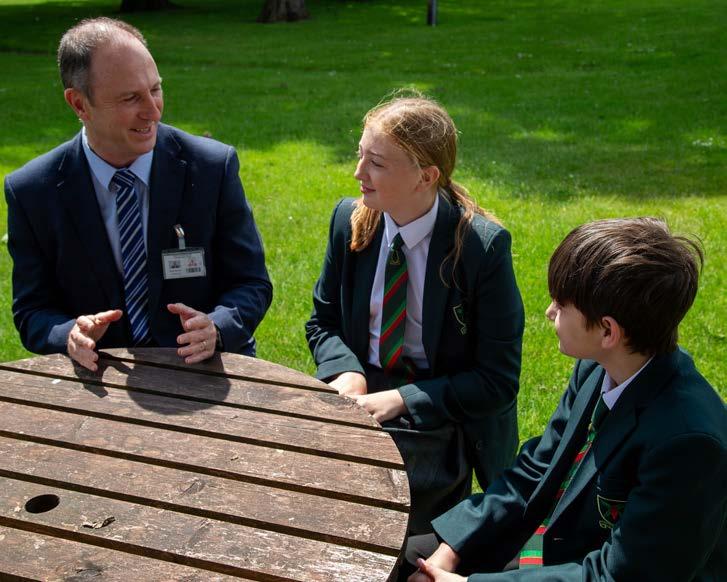
St Edmund Arrowsmith is a Catholic school. The traditions and teachings of the Catholic Faith are adhered to and promoted. In order to facilitate and nurture faith, the school undertakes to provide:
› Prayers; morning and evening
› Grace before and after meals
› Regular voluntary Masses
› Year Masses and Whole School Masses on Holy Days of Obligation
› Lenten and Advent Prayer
› Various liturgies during the year
› Participation in Charitable works and fundraising
› Away Days, Retreats and Pilgrimages
The role of the Chaplain is to have a presence in school and help to develop and deepen spirituality amongst staff and pupils. The Chaplain provides resources for prayer and liturgy including assemblies and arranges opportunities for daily prayer.
The Chaplain aims to enhance a Christian environment where everyone can feel loved and welcomed, is given a sense of dignity and respect and comes to know that they are made in the image and likeness of God.
The Chaplain is there to give time to both staff and pupils whenever it is sought – an ear to listen, a comforting word. The Chapel provides a quiet space for private prayer or to gather thoughts. We appreciate the support parents give to the children in all aspects of their life. We will seek to enable parents to foster the spiritual development of their children.
The work of a Chaplain cannot be easily explained in a few sentences. However, the Chaplain is doing their best work when they are ‘just amongst’ the pupils and staff and giving of themself.
We expect all members of our community to not only respect the beliefs and practices of the Catholic Church but the beliefs of other traditions and faiths. We ask for parent support in encouraging pupils to take an active part in the prayer and worship of the school community and their local parish community.
Please do not hesitate to contact us if you have any questions or suggestions regarding the spiritual aspects of school life.

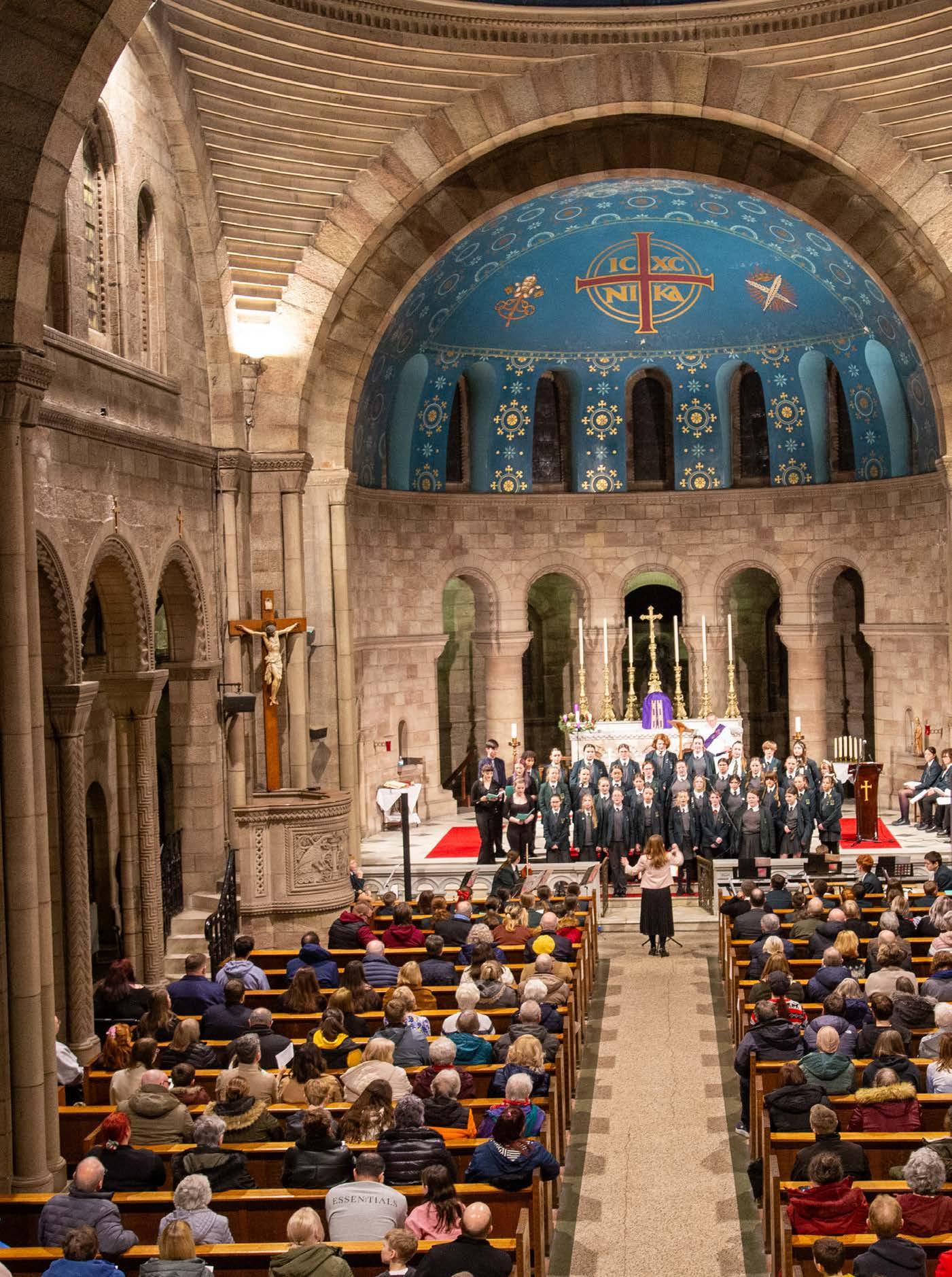

We are a Catholic school where we care for, and respect each other We aim to be a living faith community and make every effort to inspire our pupils to want to make the world a better place.
Every day, we strive to live out the values of the Gospel which are embodied in our school Mission Statement in its commitment to “Prepare the way of the Lord”, through our, ACTIONS, as these are the foundation of our relationships with each other and the wider world.
Pupils are expected to be in school by 8.35am. Due to the early arrival of school buses there is general supervision of the site by senior staff from 8.00am.
Pupils are able to utilise the dining room facilities from 8.00am onwards.
The school library is available for pupils from 8.00am, and during breaks and lunchtimes and after school until 4.00pm (except Friday).
The Learning Resource Centre is open from 8.00am until 8.30am, during breaks and lunchtimes and after school until 4pm (3.30pm on Friday). This can be used to complete and print homework or to research particular topics on the school computers.
We ask parents/carers to arrange for pupils to arrive at school as near to 8.30am as possible and no later than 8.35am.
Please note: Rookery Avenue is a ‘School Street’, which means it is a Pedestrian and Cycle Zone only between the hours of: 8.00am to 9.00am and 2.45pm to 3.45pm. Our designated drop off point is St Oswald’s Church car park on St Oswald’s Road which is only a 3-minute walk to school.
The timings of the school day is as follows
8:35 Registration
8:55 Period 1
9:55 Period 2
10:55 Break time
11:10 Period 3
12:10 Period 4
13:10 Lunch time
14:00 Movement Time
14:05 Period 5
15:05 End of school day
Pupils must attend registration every day from 8.35 to 8.55am. The timetable of activities which pupils follow ensures our young people are fully immersed in the culture of the school.
There are two options for pupils during the lunch hour:
1. The purchase of a school meal
2. A packed lunch brought from home or a combination of the two There are two Dining Rooms: The main one (near the school entrance) and the smaller Unit Dining Room.
We use a voluntary biometric recognition system in order to administer the cashless catering system in both of our school dining rooms. This system provides us with some significant benefits including:
› Reduction in pupil queuing time
› Reduction in need for cash handling
› No problems created by lost cards
› Reduced opportunities for theft or bullying
Payments can be loaded online by accessing Arbor through the school website. Alternatively, pupils can load cash onto the revaluation unit situated in the Dining Room, however NO requests for change will be accepted from pupils.
All transactions at the point of service are then automatic and so queuing times are reduced. Parents/ carers who do not wish pupils to be biometrically registered may request a Smartcard as an alternative. The maximum spend per pupil is £5.00 per day, however this can be set on an individual basis. Those pupils entitled to a free school meal are automatically credited with the prescribed amount, currently £2.60, on a daily basis. This is sufficient to purchase a “meal deal” at lunchtime. It is the pupil’s responsibility to ensure they have enough allowance left to purchase a meal at lunchtime if they use the breakfast or break facility. A maximum spend of £1 is set for use before lunchtime from the FSM allowance.
We have used the biometric system to administer our cashless catering system since its installation. Biometric information is information about someone’s physical or behavioural characteristics that can be used to identify them. There are many possible biometrics, including digital photographs, fingerprints or hand shapes. As part of our identity management system, we record a biometric measurement taken from a finger, but not a fingerprint image. The data, which is held as a short numeric code, is sufficient to recognise someone in a school community; but the amount of data held cannot be used to uniquely identify someone from a much larger population. The data cannot be accessed on any computer other than the school’s licenced server. The data that is held cannot be used to recreate a fingerprint image and will not be used by any other agency for any other purpose. Full details can be found in the Protection of Biometric Information Policy on the school website. Please note that when pupils leaves school her/his biometric data will be permanently deleted.
School has provided designated times during the school day when pupils can freely use the toilet facilities. Using the toilets during lesson time not only disrupts the pupil’s own learning but also the learning of others in the classroom. Additionally, there is a safeguarding concern when pupils use the toilets during lesson times, as they are not supervised while out of the classroom. For these reasons, pupils are strongly encouraged to limit their use of the toilet to social times, including before school, break, lunch, and after school.
If a pupil needs to use the toilet outside of these designated times, it will be at the discretion of the classroom teacher. These incidents will only be permitted in cases of an emergency. Toilet Passes will only be issued to pupils who have medical evidence that one is needed.
Pupils who have been given permission to use the toilet facilities during lesson time, are expected to wear the appropriate lanyard provided.
Pupils are not allowed in the school building before the beginning of the school day. They are permitted to go to areas of school where supervision is present. Pupils are not allowed in classrooms, unless there is a member of staff present.
All pupils of St Edmund Arrowsmith Catholic High School are expected to wear our approved school uniform, which is both smart and practical. We believe that this provides pupils with a sense of identity and promotes a belonging within our school community.
We believe that first impressions are important and for this reason, we expect pupils to present themselves in a smart, business-like appearance at all times. By consistently wearing our school uniform to the highest standards, pupils are not only presenting a positive image of our school community, but also of themselves as individuals.
In order to meet the required standard, pupils are expected to wear our school uniform correctly, e.g. shirt tucked in, top button fastened, tie correctly worn and blazer sleeves rolled down.
Furthermore, in meeting the expected standard for Personal Presentation, pupils must conform to the following requirements:
Personal Presentation:
› Hair styles must be neat and tidy and of natural colour. (Haircuts shorter than a No 2 blade are not allowed.) Long hair for both boys and girls must be tied back with a bobble when they are taking part in certain subjects/activities.
› Fashionable extremes will not be permitted. This includes hair extensions, shaved heads, skin fading, pattern shaving, “mullet” cuts, unnatural or two-toned colours.
› Hair of different lengths must be blended.
› Mousse/gel/hairspray should not be used.
› Facial hair must not be visible. Pupils should be clean shaven.
› The use of make-up is NOT acceptable – pupils wearing makeup which is visible will be expected to remove it. This includes fake tan.
› Nail varnish and the wearing of false nails and false eye lashes are NOT allowed.
› Piercings are not allowed and ‘recent piercing’ will NOT be accepted as a reason for keeping jewellery in during the school day and MUST not be covered with plasters.
With regards to jewellery and personal items, pupils are allowed to wear a watch but this must not be a SMART WATCH. No other items of jewellery, piercings or personal items are permitted, this includes ear pods.
If any pupil is seen to be wearing more jewellery or personal items than is allowed in line with our policy on Personal Presentation, the member of staff concerned will confiscate the item in the first instance. The item will be put into an envelope, clearly labelled with the pupil’s name and it will be given to the Director of Learning. This will then be placed in reception for parents/carers to collect.
If any item is confiscated from the same pupil on more than one occasion in any half-term. Sanctions for defiance will be imposed.
All pupils are expected to wear our school uniform as required:
Uniform
› Green blazer with school badge. This must be worn at all times.
› Grey school jumper with school badge (optional)
› Shirt/Blouse: plain white
› Skirt: knee length grey with two inverted pleats (front and back)
› Trousers: plain black (boys)/ SEA grey specified style (girls)
› Socks: plain black (boys) (if wearing trousers)
› Tights: black opaque tights (if wearing a skirt)
› School tie
› Shoes - sensible plain black
Shirt This MUST have a top button that is fastened at all times. It should be tucked into the skirt or trousers.
Tie Pupils MUST ensure that the tie is worn to correct length; crest visible below tied knot.
Trousers This item MUST be a tailored style and must NOT be ‘skinny’, ‘slim fit’ or denim/ fashion style.
Skirt This item MUST be worn at knee length and must be the style with two inverted pleats (front and back) and the SEA badge visible. If a skirt is worn, black opaque tights can be worn.
Jumper This is an optional item and MUST be the grey school jumper with the school badge. This MUST NOT be worn instead of the school blazer.
Footwear This MUST be a plain black shoe without logos – high/wedge heels, boots, sandals, pumps, training/sports shoes, sports branded footwear (such as ‘Nike’) will NOT be allowed. In snow, pupils may wear wellington boots/boots whilst travelling to and from school but will be expected to bring school shoes to change into once in school.
Outdoor Coat Outside coats or jackets should be plain black, without any logos or motifs. Outside coats or jackets must not be worn anywhere in the building. In cold weather however, ONLY BLACK outside coats may be worn over the blazer at breaks and lunchtimes.
Please note: Casual outer garments such as hoodies, sweatshirts, tracksuit tops baseball caps are not part of the SEA School Dress Code and should not be worn to school.
*Disclaimer: The school reserves the right to make the final judgement on any of the above
EQUIPMENT: ALL PUPILS ARE EXPECTED TO HAVE BASIC EQUIPMENT WITH THEM EVERY DAY TO ENSURE THAT THEY ARE READY FOR LEARNING:
Equipment
For Design and Technology
For Performing Arts
All pupils MUST have following items on a daily basis:
› School bag – large enough to carry books and equipment
› Pencil case with pen, pencil, ruler, rubber and coloured pencils
› Maths equipment
› White cotton craft apron for workshop activities.
› Green and white striped tabard
Dance:
› Plain black leggings
› Black t-shirt with school logo and ‘performing arts’ embroidered on front OPTIONAL: Dance printed on back
› Ballet shoes, soft-sole jazz shoes or foot thongs
All pupils are expected to have the required PE kit available from our approved suppliers. For Physical Education/Core PE
› Pupils must always have minimum kit requirements for their PE lessons.
› All items of kit must be clearly labelled with a pupil’s name.
› Kit described as ‘plain’ must not be branded with brand logos. (The changes in minimum kit requirements have been introduced following government guidelines to ensure that PE kit is affordable and socially levelling.)
› Pupils are expected to bring the minimum kit which is appropriate for each activity and for the forecasted weather. Pupils will be allowed to wear base-layers, gloves etc. IN ADDITION to their PE kit if the teacher deems it suitable.
› Please be aware that studded boots are essential for boys’ outdoor lessons as training shoes DO NOT provide a sure enough footing on grass.
› Pupils may shower after every lesson if they wish and will need to bring necessary supplies to do so.
Those pupils who are not participating in PE (for a valid reason, eg injury) MUST also have a FULL PE kit as they will have a role in all lessons as a coach, observer or referee.
Boy’s and Girls Indoor Kit
Boys’ and Girls’ Outdoor Kit (in addition to indoor)
CORE PE KIT MINIMUM REQUIREMENTS
› Plain black shorts (boys and girls)* NB: Not ‘micro’ shorts/cycle shorts OR Plain black opaque leggings (girls only)*
› White polo shirt with SEA badge*
› Black football socks are required for ALL Boys PE lessons / Girls can wear black ankle socks (apart from when they are on football)
› Trainers suitable for indoor and Astroturf use (eg Converse, Vans, etc are NOT allowed)
*Can be worn as outside kit
› Red hoodie with SEA badge (girls only)
› Green reversible rugby shirt with SEA badge (boys only)
› Studded boots (for boys & girls)
› Shinpad/guards (essential for Football and Hockey)
› Sports bra for those pupils who require extra support and comfort
› Black football socks are required for ALL Boys PE lessons / Girls can wear black ankle socks (apart from when they are on football)
› Plain black tracksuit bottoms.
› Gum shields and shin pads are optional for PE lessons but are a requirement for competition
› Black polo shirt with SEA badge (instead of white polo).
› Black hoodie with SEA badge (instead of red hoodie/green reversible rugby shirt)
PLAIN ITEMS MUST NOT BE BRANDED WITH BRAND LOGOS
At St Edmund Arrowsmith, we take pride in maintaining a high standard of uniform that reflects the professionalism and focus we expect from our pupils. As part of this, we have clear guidelines on acceptable footwear to ensure consistency and promote a smart appearance.
Pupils are required to wear plain black shoes that meet the following criteria: -
› Shoes, not boots or trainers
› Free from any visible sports logos or branding
› Flat-soled for safety and comfort
› Made of polishable material to ensure they are kept in good condition
Footwear should not include:
› Trainers or any form of sports footwear
› Shoes with high heels, which can be unsafe
› Shoes with excessive decoration, such as large buckles, patterns, or embellishments

In circumstances where a pupil arrives to school with inappropriate footwear for no valid reason, alternative shoes will be provided.
If you have any questions regarding footwear, please contact school.
At St. Edmund Arrowsmith Catholic High School, our aim is to provide and broad and balanced curriculum, which ensures continuity and progression, and which meets the need of all learners. We aim to provide challenge, develop motivation and ignite ambition, administered in a learning environment which is safe, supportive and caring. We believe that each child is uniquely talented and aim to deliver appropriate and targeted provision so that all reach their potential and acquire a love of life-long learning.
We offer a well-planned and sequenced curriculum, delivered through excellent teaching, which promotes breadth and depth of learning, promoting new knowledge and skills. We offer a traditional, academic core, alongside complementary creative, practical and vocational subjects; coverage, content and structure are implemented effectively through careful planning and logical ordering.
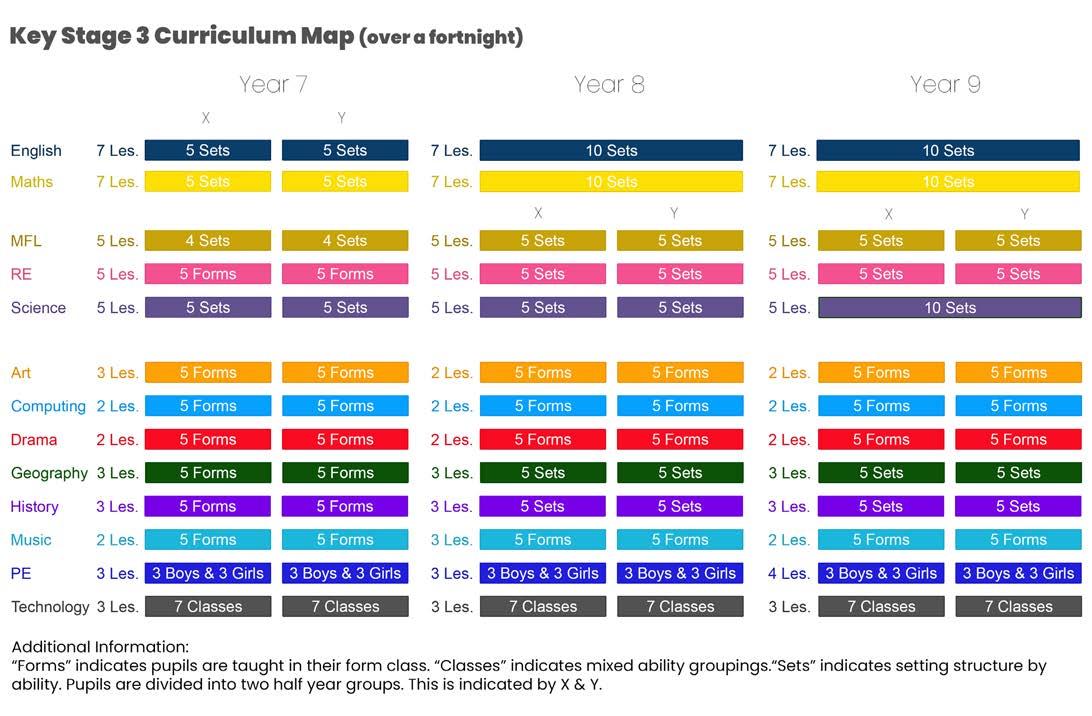
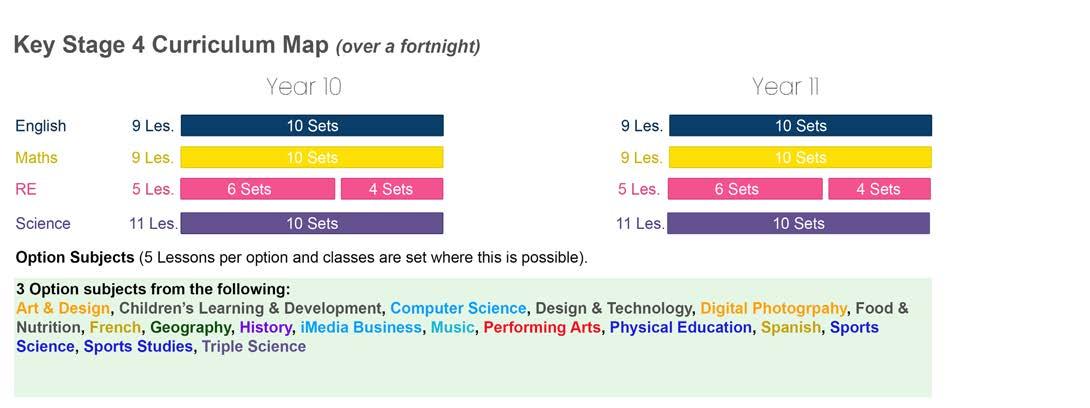
At St Edmund Arrowsmith Catholic High School we aim to educate the whole child and we attach great importance to what goes on outside the classroom. Every subject has an extracurricular dimension and, on most lunchtimes, and after school evenings there are clubs and societies which meet to further interests and abilities in a particular area. In addition, we have regular musical concerts, theatre productions and sporting fixtures throughout the academic year which give pupils further opportunities to showcase their talents.
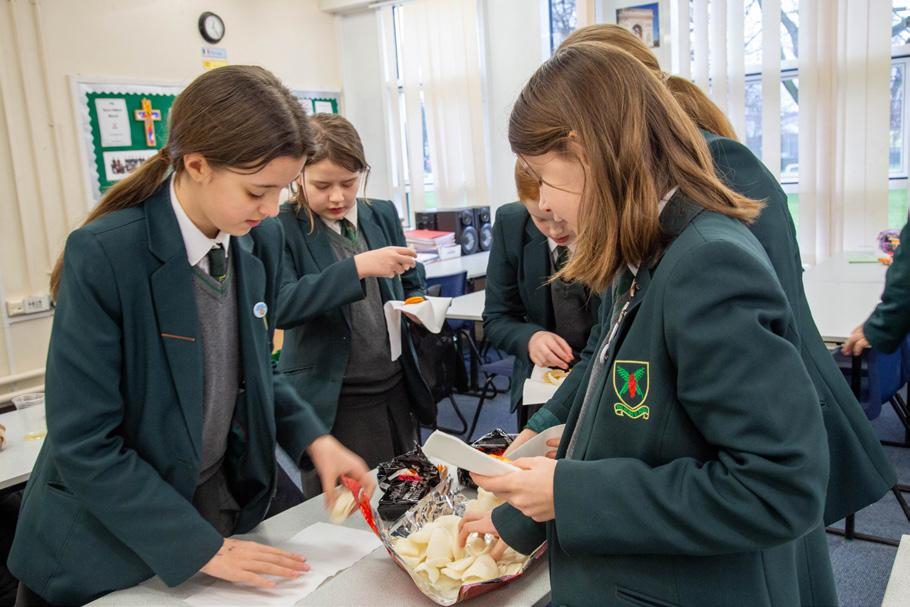
Examples of activities for pupils to access include
› Drama Club
› Cakes and Classics
› History Club
› Numeracy Club
› Year 7 Choir
› Year 7-11 Concert Band
› Senior Choir
› Music Enrichment
› KS3 Badminton Club
› KS3 Dance
› KS3 Trampolining
› KS3 and KS4 Football for girls and boys
› KS3 and KS4 Netball
› KS3 and KS4 rugby.
› Science Club
› Lego Club
› Textiles Club
› Faith In Action
› KS3 Lectio Divina
› Craft Club
› Chess Club
› Neuro Diversity Gym Class
› Student Council
› Homework Club
› Culture Club

There are also a variety of enrichment activities/school trips offered to pupils from many departments in school
The Personal Development Curriculum aims to develop positive attitudes and values in pupils by enhancing their spiritual, moral, social and cultural development through Health Education, Relationships and Sex Education, Citizenship and Careers Education Guidance. Any such experiences specifically enable pupils to:
› Develop lively, creative, enquiring minds, through a full range and breadth of subjects and experiences
› Acquire knowledge and skills relevant to adult life and a world of rapid and continuous change
› Develop personal and moral values, respect for shared values and for other cultures, religions and ways of life
› Develop an understanding of the world in which they live which includes their local community and beyond
› Appreciate their achievements and aspirations
› Experience success and celebration of their achievements
› Take their place in society as informed, confident and responsible global citizens
› Become fully equipped to make well thought out decisions and develop life-long skills to search for and succeed in the future.
Within the Personal Development Curriculum and the wider school community there is a shared responsibility and co-ordinated approach to successfully deliver the pupils’ entitlement of the four strands (Health Education, Relationships and Sex Education, Citizenship and Careers Education Guidance) which creates enjoyment, and an opportunity for pupils to challenge their thinking and views. The Personal Development Curriculum is ever changing which responds to the needs of our school community by encouraging pupils to become more inquisitive about the world around them, through equipping them with the skills and values needed for life in making a positive contribution as responsible citizens in their communities.
All pupils follow the Personal Development Curriculum, where a variety of delivery methods are used to meet the needs of all pupils. There are no explicit lessons taught within curriculum time. Content is delivered through informal workshops, assemblies, discussions, written work, role-play and theatre productions and pastoral curriculum time. Citizenship is taught explicitly through RE, English, Geography, History and Maths at Key Stage 3. Spiritual, moral, social and cultural education permeate all areas of the Personal Development Curriculum.
Careers guidance is offered by the Careers Advisor through an SLA with Planning4Change. This is supported by Mrs Rebecca Paul with admin support from Ms Claire O’Shaughnessy. Careers guidance is concerned with the development of all pupils in relation to the adult world and increasing the awareness of personal educational and vocational opportunities. To fulfil the legal requirements of Careers Education and Guidance, the Careers Department provides ready access to up-to-date careers information through the Careers Library and IT facilities. These facilities are available before and after school as well as every break and lunchtime. To enhance this process, the Careers Service, St John Rigby and Carmel Sixth Form Colleges, representatives from further education and employers make regular contributions to the Careers Education and Guidance programme.
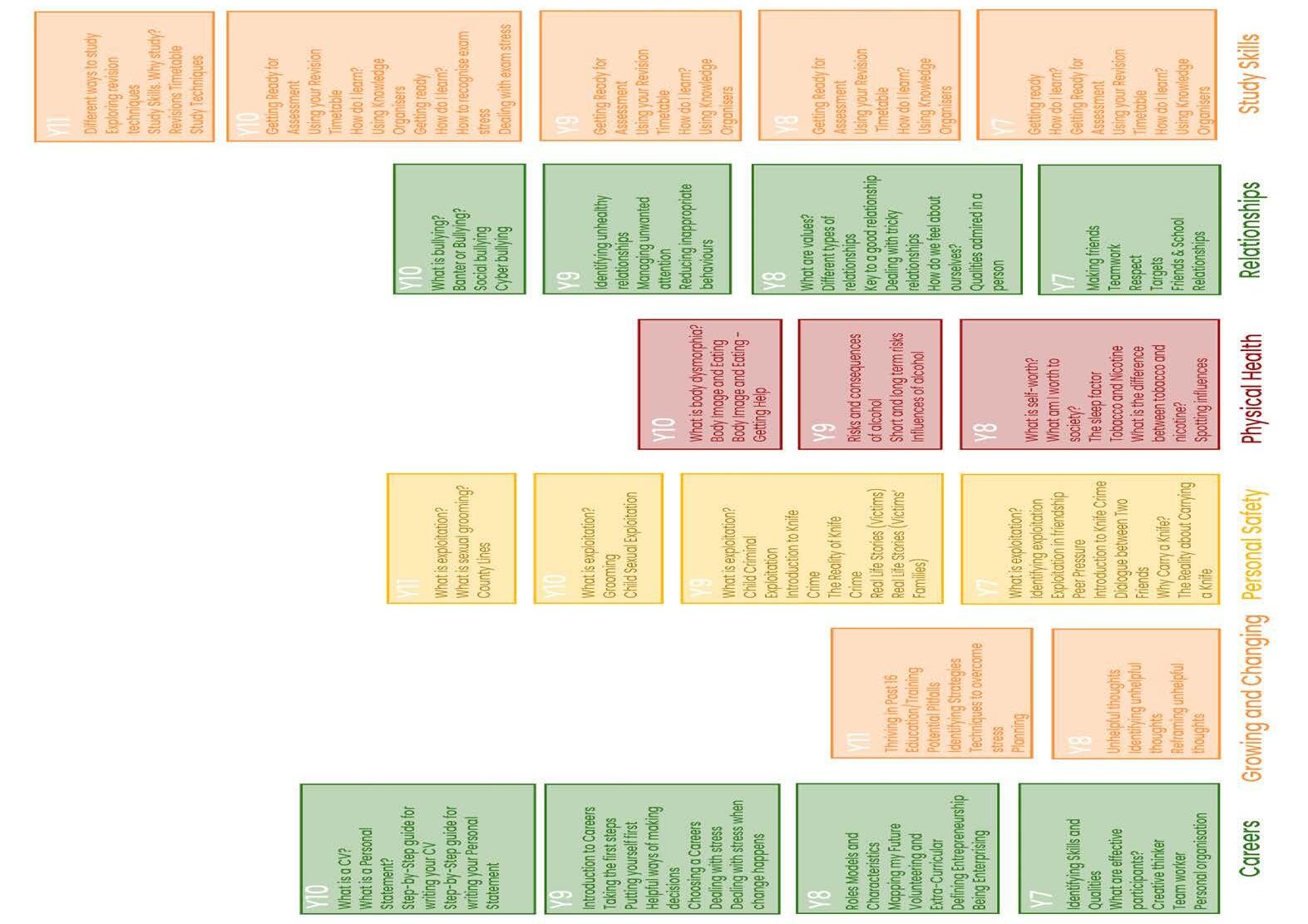
At St Edmund Arrowsmith, we have high aspirations and expectations for all pupils in all subjects. We believe that every pupil should aim to fulfil their God given potential, and we will do everything in our power, as educators, to help them to do so.
Assessment is a key tool in achieving our aim and is something we want all of our pupils to take seriously, regardless of whatever year they are in. Assessments allow pupils to receive regular feedback on the quality of their work and helps them to understand their level of progress and identify areas for improvement. In addition, assessment complements and assists teaching and learning – it plays an integral part in each teacher’s planning so that they are able to evaluate the effectiveness of their lessons and adjust teaching strategies accordingly.
All assessments at St Edmund Arrowsmith fall under the following two areas:
1. Formative assessment– this is an ongoing element of our teaching whereby teachers regularly check pupil understanding. Typically, this will be:
› Questioning in lessons
› Marking of pupils’ work ‘live’
› Quizzes or mini-tests in lessons or set as homework
› Practice examination style questions or essays in class or set as homework
2. Summative assessment– to assess, more formally, how well pupils are learning and remembering the curriculum. Typically, this will be:
› A test, exam or practical assessment
› An exam style question taken in timed or ‘exam’ conditions
› An extended piece of work/project
At two stages within the year, pupils in Key Stage 3 will have two ‘assessment windows’. Prior to the assessment windows commencing, pupils will be informed of the topics they need to revise for each of their subjects and will be given an exam timetable so they know when each assessment will be. These assessments will be marked by their classroom teacher and their work will be awarded a Performance Level. Performance Levels range from A-D. If a pupil does not receive enough marks in their assessment, they are awarded an ‘X’.
During assessment window 2, Year 9 pupils will sit the assessments for their core subjects i.e. English, Maths, Science and RE under exam conditions in the Sports Hall. This begins their experience of practising formal examinations in order to build exam skills, reduce anxiety and to familiarise them with the format and expectations of national examinations.
Pupils have Year 10 Mock Exams which are held in December, and End of Year 10 Exams held in June. Similar to Key Stage 3, prior to both of these assessment windows commencing, pupils will be informed of what topics they need to revise and will be given an exam timetable so they know when each assessment will be. In Year 10, the majority of assessments take place in the Sports Hall. The only exception will be for those courses who complete NEAs (Non-Exam Assessment).
Year 11 have ‘Trial Examinations’ in January. These examinations mirror exactly how they will be assessed at GCSE e.g. pupils will sit the same number of papers as they will for their public exam e.g. three papers for Maths, two for English Literature, two for English Language etc. Following these exams, pupils are given their results officially during our ‘Trial Results Day’.
Year 7
Assessment Window 1 - Monday 10th November - Friday 21st November 2025
Assessment Window 2 - Monday 11th May - Friday 22nd May 2026
Year 8
Assessment Window 1 - Monday 10th November - Friday 21st November 2025
Assessment Window 2 - Monday 11th May - Friday 22nd May 2026
Year 9
Assessment Window 1 - Monday 10th November - Friday 21st November 2025
Assessment Window 2 - Monday 11th May - Friday 22nd May 2026
Year 10
Year 10 Mock Exams - Thursday 27th November - Friday 5th December 2025 End of Year 10 Exams - Monday 1st June - TBC (dependent upon finalised GCSE calendar)
Year 11
Year 11 Trials - Monday 12th January - Friday 23rd January 2026
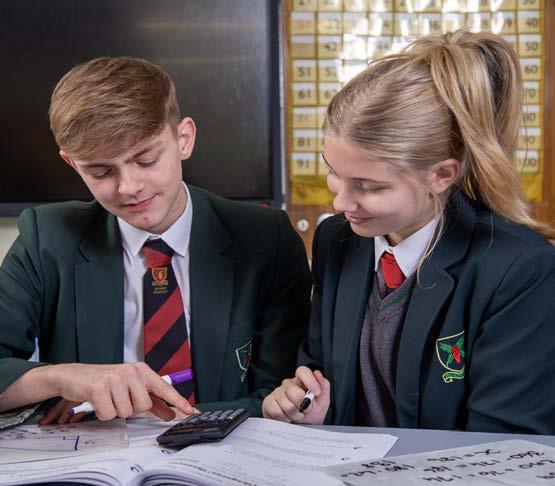
At the end of each assessment window, parents are provided a written report which outlines how their son/daughter performed in their recent assessment. This report contains the following information for each of the subjects that they study:
1. Expected Performance Level (Key Stage 3) / Target Grade (Key Stage 4)
2. Performance Level/ Grade achieved within the assessment
3. Indication if they are At/Above/Below their expected level (colour coded) Their recent AtL score that has been awarded by their teacher (see ‘AtL’ below for further information about AtLs)
Over the course of an academic year, all parents will have 3 formal points of contact with school with regards to how your child is progressing. This will consist of:
› Guidance Evening
› Parents’ Evening
› Progress Review Day
These evenings provide parents with the opportunity to speak to key members of staff in relation to your child’s education.
Our Attitude to Learning judgements or ‘AtLs’ are one way in which we instil into the children how we have high expectations both of them, and for them.
Teachers will consider each of the five strands of learning that we are looking pupils to display –Challenge; Independence; Collaboration; Resilience and Metacognition. Upon consideration of their abilities in each of these areas, teachers will award an overall grade from 1-4. 1 being the best and 4 being the worst.
A copy of the AtL level descriptors used by teachers can be found on the next page.
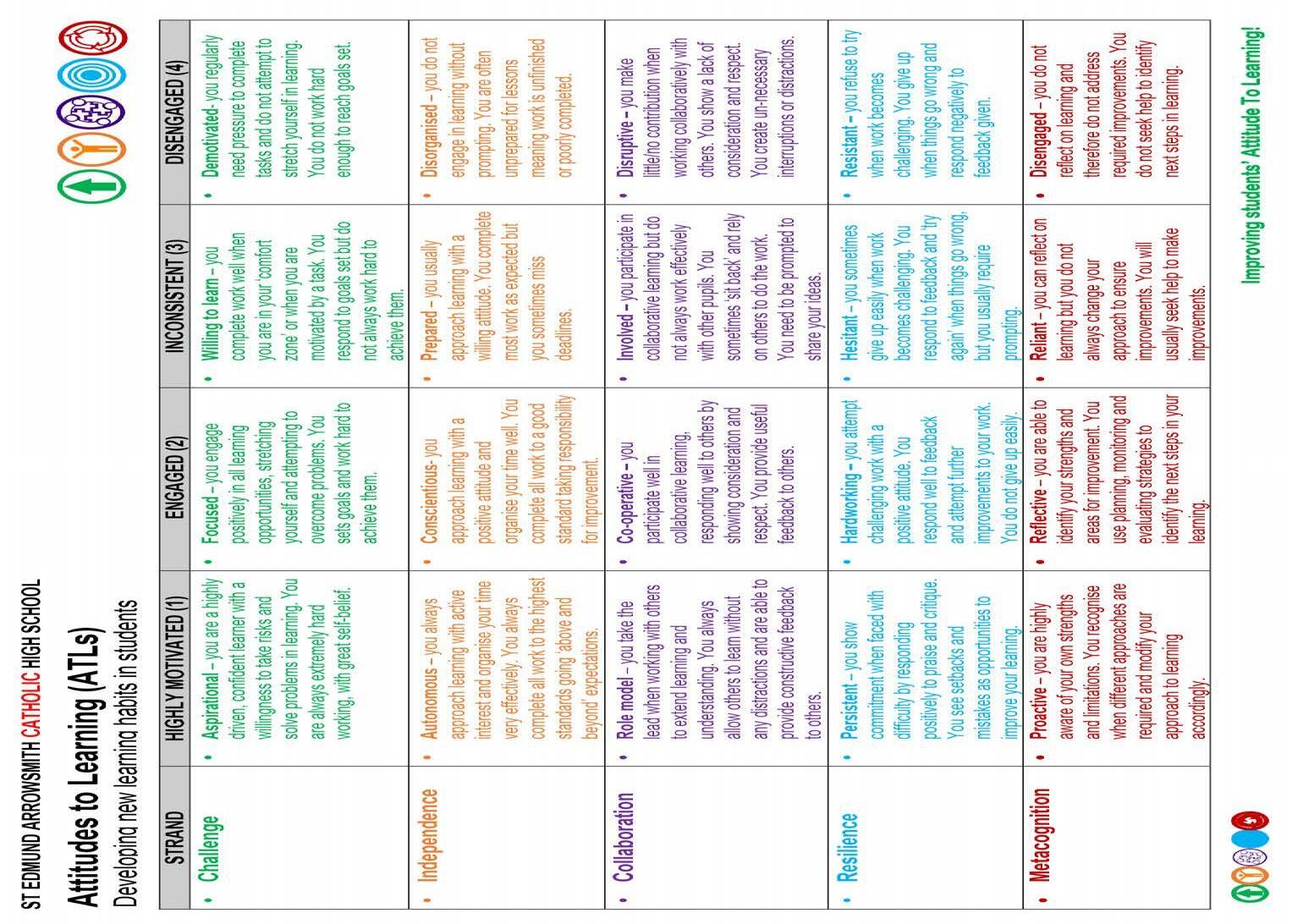
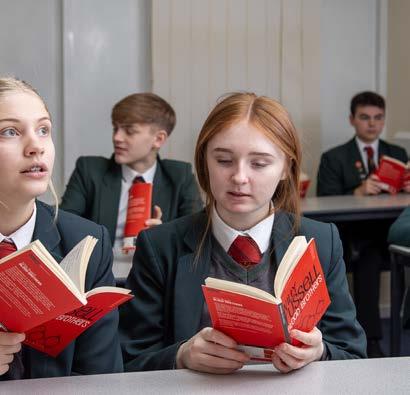
How often will I receive a report about my child’s progress?
All parents will receive progress reports on three occasions throughout the year:
1. A summary report after Assessment Window
2. A face-to-face Parents’ Evening
3. Progress Review Day which is a combination of the above How are targets set for my child?
To set pupil targets, we use data derived from Fischer Family Trust or FFT. FFT is national data that takes into account a number of factors such as: pupils Key Stage 2 scores, age, gender and month of birth, and by comparing all of this data to similar pupils across the country, it generates an aspirational but achievable target in each subject.
My child is struggling in a particular subject; what should I do?
Either send a message through Arbor FAO your child’s classroom teacher or call the school office and ask for a message to be passed on.
What happens if my child is shown as being below target?
If you child is below target, this indicates that they have not performed as expected in their last summative assessment. In this case, subject teachers will investigate the reason for underperformance and bespoke intervention will be put into place in an attempt to avoid repetition at the next assessment point.
My child is always shown as being ‘on target’ and is never shown as being ‘above target’; does that mean they are not making progress?
No, expected outcomes are progressive: this means that when a pupil remains ‘on target’, this will represent that progress is continually being made in that subject.
What should I do if I have a question about the content of my child’s school report?
Either send a message through Arbor FAO your child’s form teacher or call the school office and ask for a message to be passed on.
I feel like my child is falling behind. What can I do to help?
Please contact your child’s form teacher or Director of Learning, depending on what area this relates to. You can do this either via Arbor or by calling the main office.
The safeguarding of our school family is everyone’s responsibility and should always be the number one priority. If pupils, parents or staff have concerns about the wellbeing and safety of others the following process should be followed.
Pupils who are concerned about their peers should speak to the following:
› Form Tutor.
› Director of Learning.
› Any member of staff.
The Pastoral Hub is a place in school where pupils can share concerns in a private and safe environment.
The Designated Safeguarding Lead for school is Ms A Morgan. Please see her directly with concerns about pupils.
If parents are concerned about a child’s wellbeing, please contact Mrs A Morgan. She is available during academic hours in term time at amorgan@arrowsmith.wigan.sch.uk or via telephone on 01942 728651. Referrals can also be made using Arbor.
However, should the concern be a serious one where there is an immediate risk of harm to a child, then 999 should be used.
A variety of safeguarding advice and guidance can be accessed through our school website following the link below. This provides information to pupils and families with signposts to helpful websites and external agencies.
› WIGAN LOCAL AUTHORITY SOCIAL CARE TEAM: 01942 828451
› ST HELENS LOCAL AUTHORITY SOCIAL CARE TEAM: 01744 676600
› OUR LOCAL POLICE – 101 or in an emergency, call 999
Excellent attendance and punctuality are not only key factors in learning and raising achievement but they are also important skills for lifelong learning. For pupils to gain the greatest benefit from their education, it is vital that they attend regularly and be at school, on time, everyday unless the reason for the absence is unavoidable. It is therefore critical that parents and carers ensure their child attends school every day, on time.
The ladder below reflects our school’s expectations regarding attendance.
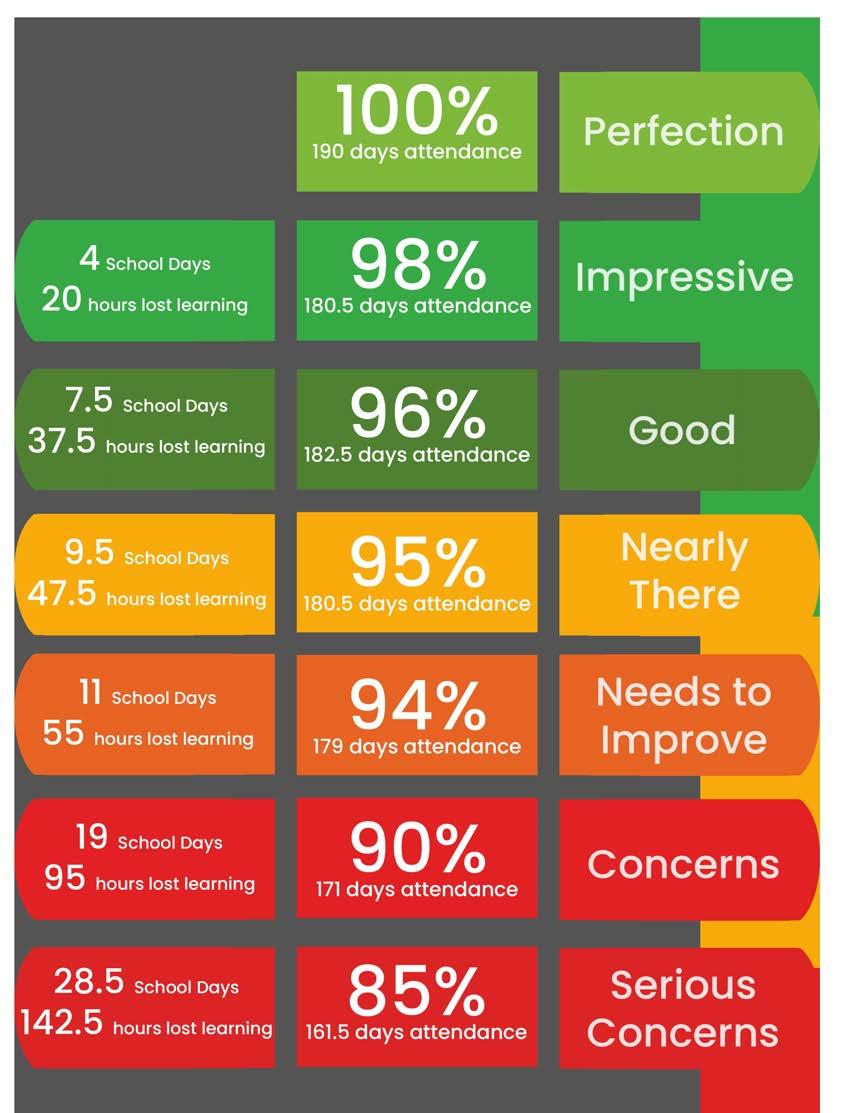
Attending a medical or dental appointment will be counted as authorised if the pupil’s parent/carer notifies the school in advance of the appointment.
This is the agreed procedure:
› Parents/carers should notify school via letter/email or Arbor, alerting them to the upcoming appointment.
› On the morning of the appointment, pupils should go to the Attendance Office and request a permission slip to leave school.
› Pupils should carry this permission slip with them until the agreed time to leave school.
› Pupils should show this permission slip to the relevant class teacher and then leave class.
› Pupils should then go to reception and sign out.
However, we encourage parents/carers to make medical and dental appointments out of school hours where possible. Where this is not possible, the pupil should be out of school for the minimum amount of time necessary.
Approval for term-time absence:
The Headteacher will only grant a leave of absence to a pupil during term time if they consider there to be ‘exceptional circumstances’. A leave of absence is granted at the Headteacher’s discretion, including the length of time the pupil is authorised to be absent for.
Any request should be submitted as soon as it is anticipated and, in accordance with any leave of absence request form, accessible via the school website or Attendance Officer.
Families of pupils who are absent from school during term-time due to a family holiday or similar event, will be issued a fixed penalty notice.
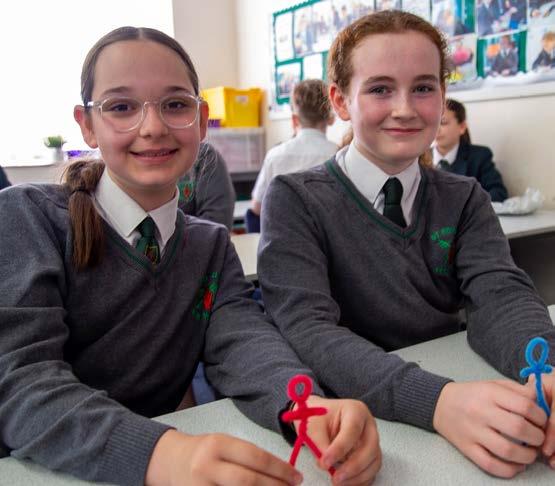
If a pupil is ill parents/carers should:
Inform the school on the first day of absence and before 9.30am and give an indication as to their likely return.
Contact school through Arbor. If this function is unavailable, parents/ carers should email reception.
Parents must provide a satisfactory explanation for the pupil’s absence from school. If a text message is received as a result of a pupil’s absence it is important that parents/carers respond to this text to ensure a pupil is appropriately safeguarded.
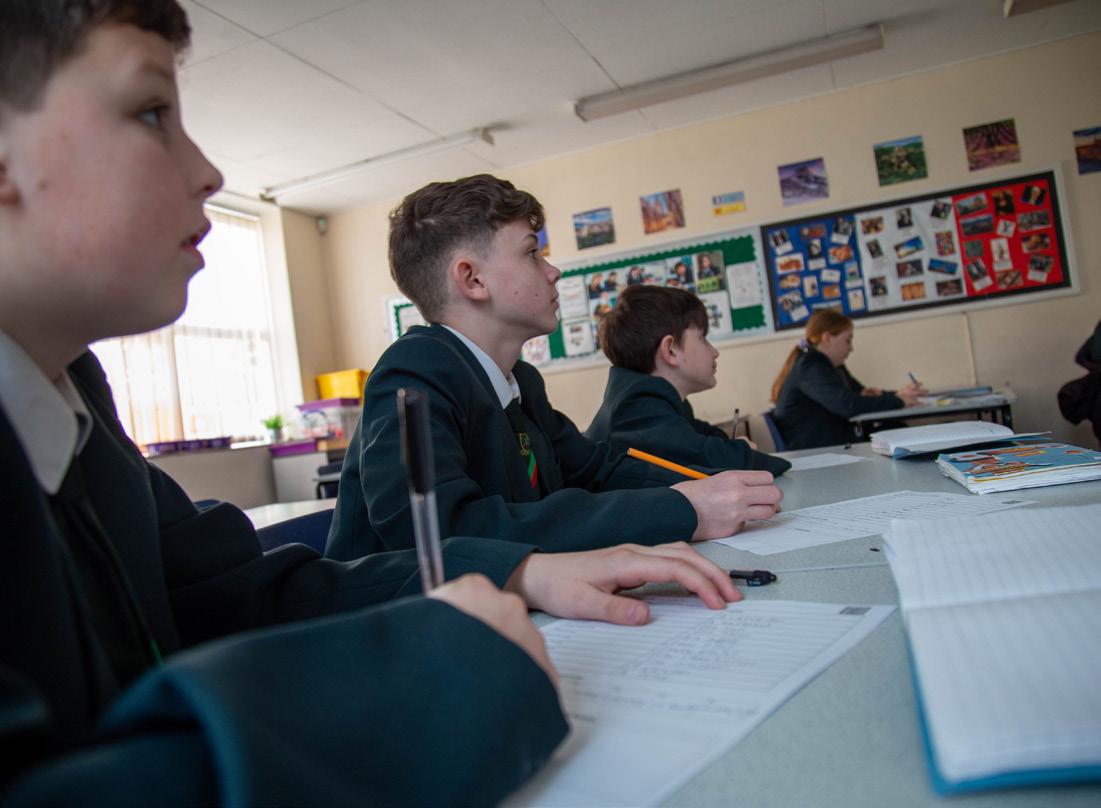
In case of emergency we need up to date contact numbers at all times. Please inform school of any changes especially to mobile telephone numbers. As a school we request a minimum of 3 emergency contact details be provided.
Procedures which school will follow if an unplanned absence arises
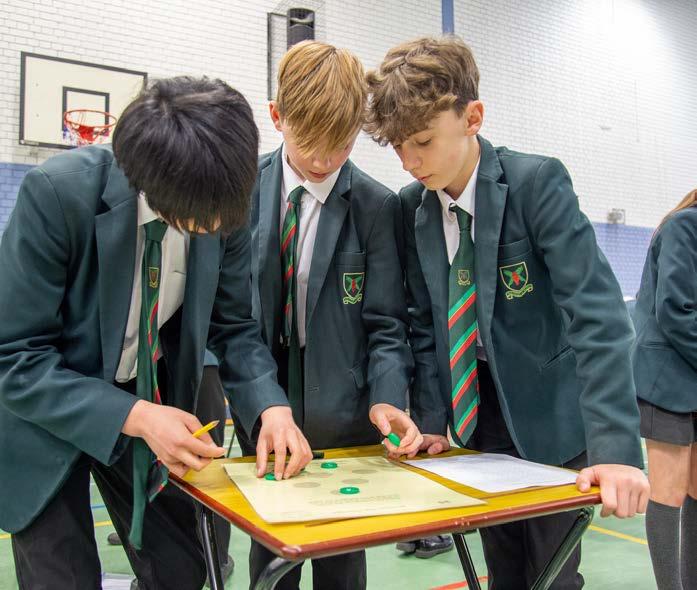
› Telephone or text Parent/Carer on the first day of absence if no communication has been received by 9.30 am.
› Mark an absence due to illness as authorised unless the school has a genuine concern about the authenticity of the illness.
› Ask the pupil’s parent/carer to provide medical evidence, such as a doctor’s note, prescription, appointment card or other appropriate form of evidence, if the authenticity of the illness is in doubt.
› Record the absence as unauthorised if the school is not satisfied with the authenticity of the illness.
Persistent absence is defined as any child whose cumulative attendance is 90% or below at any point in the school year. This level of absence has the potential to hinder the progress of pupils and school will issue fixed penalty fines accordingly.
A fixed penalty fine will be issued if ten or more sessions have been missed by a pupil.
A national threshold of 10 unauthorised sessions for any reason (equivalent to 5 school days) within a rolling 10 school week period is when a penalty notice must be considered. Parents/carers will no longer be able to take pupils out of school for one week’s holiday without a penalty notice being issued.
There will be a penalty fine from of £80 if paid in 21 days. If the fine is not paid by the first 21 days, it will rise to £160 if paid within 28 days of being issued.
If a second penalty fine is issued to the same parent/carer for the same pupil within a 3 year rolling period, the fine will automatically rise to £160 with no option to pay the lower rate of £80.
If a parent/carer then commits a third offence in a 3 year rolling period, the local authority will need to consider other enforcement options available to them.
Please be aware that Education Penalty Notices can also be issued if you’re a pupil persistently arrives late for school after the close of registration at 9.30am (10 U codes within a rolling 10 school week period)
At St Edmund Arrowsmith, we pride ourselves on the high standards of behaviour displayed by pupils in our care. Pupils are very clear about the types of behaviours that are expected and understand the results of the choices that they make.
St Edmund Arrowsmith focuses on the achievements of pupils and choose to recognise and celebrate those in the first instance.
In order that our community functions effectively and happily, expectations of pupils are high. Consideration for others is stressed, as is the importance of each pupil fulfilling her/his potential. Pupils are encouraged to take pride in every aspect of their school lives; work, appearance, relationships and care of the fabric of the buildings are examples of where this principle applies. The expectations we have of our pupils is laid out in the “Codes of Conduct”.
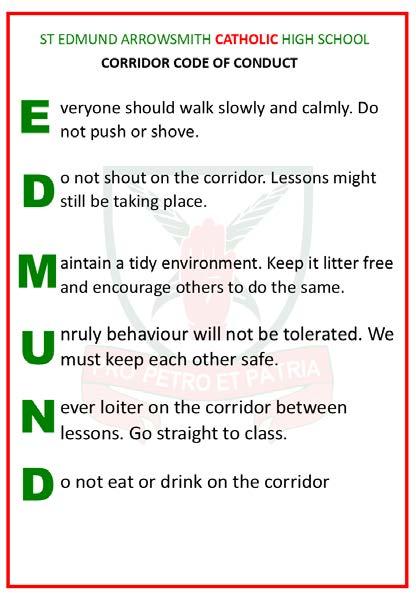
Behaviour Points
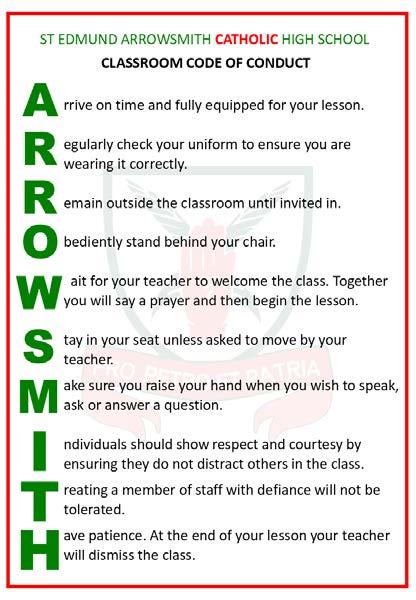
Staff will assign points via Arbor. These will be monitored by Directors of Learning Lunchtime Detentions/ Director of Learning Detention/ SLT detention
Detentions will last for 25 mins or for 1 hr. Detentions issued by class teachers will last for 25 minutes. However, DoL/SLT detentions are more serious and pupils will not be allowed to mix with their peers. These detentions are non-negotiable. More serious sanctioning will result in failure to attend detentions.
Afterschool Detentions
These detentions are actioned for serious misdemeanours in school. Pupils will typically be given 24 hrs notice of an after-school detention. It is imperative that these sanctions are fulfilled. Parents/carers must arrange alternative transport for pupils.
Headteacher Detentions
These will take place on a Friday and will last until 4pm.
Where all the classroom behaviour strategies have been applied and pupils do not improve/correct their behaviour the following sanctions will be applied.
In the most extreme circumstance, pupils may be placed in Remove where they will be supervised by a senior member of staff. Pupils are expected to behave appropriately if placed in Remove. Any challenge to the sanction will result in pupils being asked to leave the premises. Further and more severe sanctions will then be put into place. When placed in remove, pupils must hand in their mobile phones to the member of staff on duty, who will place it in a secure location until the end of the day.
If a pupil presents poor behaviour, the Director Of Learning will monitor that pupil’s behaviour via a monitoring card. This is a document which will be manually filled out by the class teacher. It will be checked daily and should only last approximately three weeks, so that triggers can be identified and pupil supported.
If a pupil continues to present inappropriate behaviours, they will be supported by an Individual Behaviour Plan. Pupils will be set individual targets in collaboration with parents/carers following communication with class teachers. Pupils’ behaviour will be monitored via Arbor. Class teachers will comment on whether targets have or have not been met. These targets will be reviewed daily by the Director of Learning and progress will be discussed at regular points with parents/carers. This programme should typically last 6-8 weeks. At this point, the Director of learning will decide whether or not the plan has been successful in adjusting behaviours.
In collaboration with local schools, a respite placement is offered to pupils to allow them to break behaviour patterns. Respite placements last approximately 6 weeks.
Pupils whose behaviour becomes a huge concern will be placed on this programme. At this point, a pupil’s place in school is at risk. School will place a variety of measures in place to support the child. As is the case with an Individual Behaviour Plan, pupils will benefit from very specific targets. This plan will last 12 weeks.
Permanent exclusions will only be used as a last resort, in response to a serious breach or persistent poor behaviour and defiance of the school rules.
Parental Involvement: If a pupil is at risk of permanent exclusion due to persistent breaches of the school’s behaviour policy, this will be communicated to their parents or carers during meetings or telephone calls. During these discussions, options for support to avoid a permanent exclusion will be explored. However, if these options have been exhausted or are deemed no longer suitable, a permanent exclusion may be issued. A serious breach of our behaviour policy may involve drugs, fighting, possession of banned substances or items, assault against an adult or pupil, and/or possession of weapons. This list is not exhaustive.
It is believed that teachers and pupils should be dealing with rewards more frequently than dealing with punishments, and that discipline should be dealt with positively via approval and recognition of success.
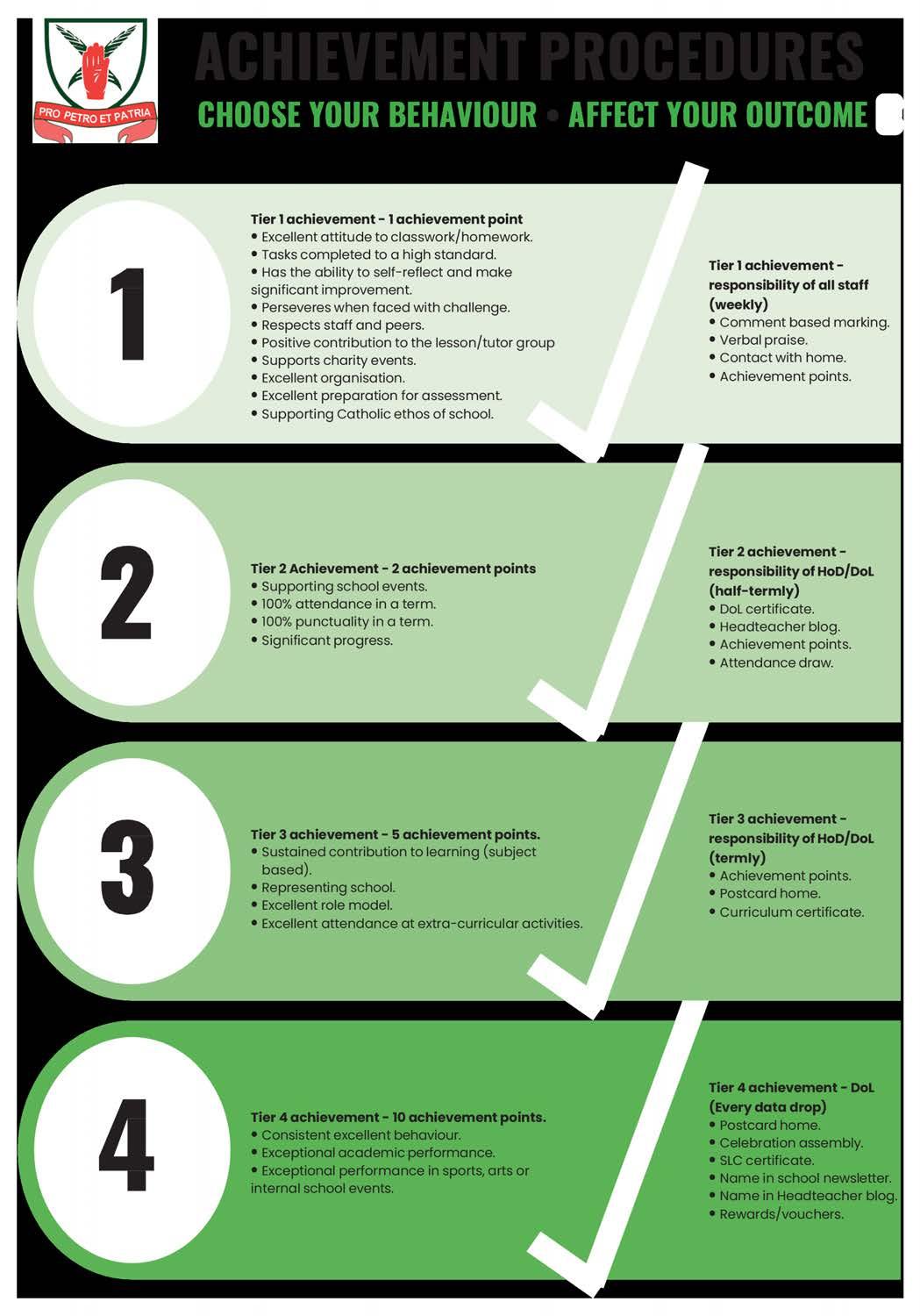
When, however, it is felt necessary, sanctions are imposed. A range of sanctions are used, each case being separately assessed.
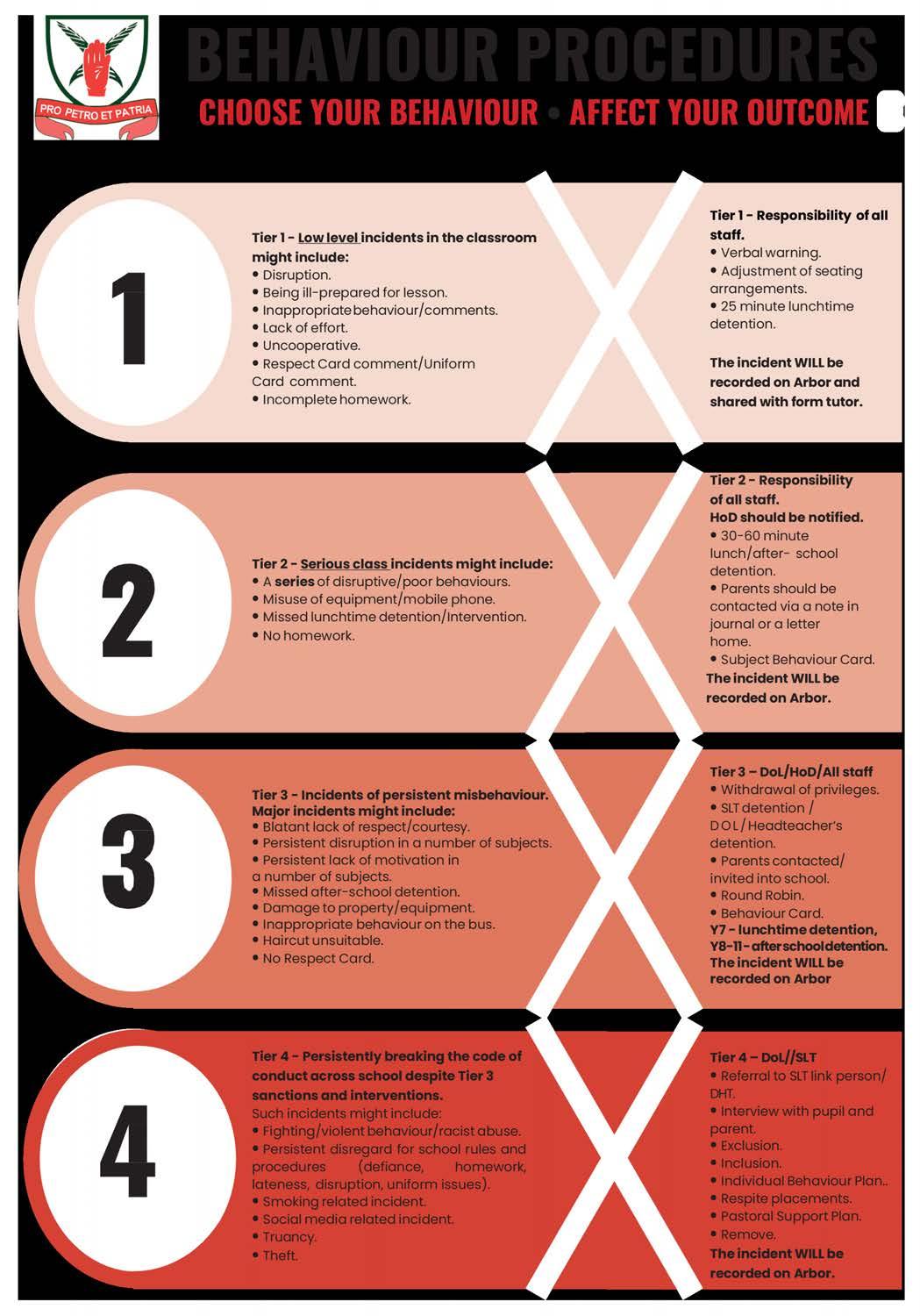
As a school, we understand the ever-changing landscape of the online world and the responsibility we have to ensure young people are safe when using it. The rapid growth of AI, social media and other technology has given young people wider access to the online world. It is important that pupils benefit from amazing opportunities to learn, develop and connect, but are kept safe and protected online – including their data. We expect everyone who chooses to use Social Media to use it appropriately, professionally and in accordance with our expectations. Anyone who breaches our rules, will face sanctioning.
The school accepts that mobile phones are “part and parcel” of everyday life for many young people. However, the non-essential use of mobile phones on the school site and related issues are a distraction to our core purpose.
› The school would prefer pupils not to bring mobile phones to school. This is for reasons of security. If a pupil does bring a mobile into school, it is their responsibility, not the responsibility of the school.
› Pupils must not use their phone anywhere on the school site during the school day. This includes making or receiving calls, texts, emails, taking photographs, videos or listening to music. In essence, phones should not be seen or heard and always be turned off when pupils are on site. Under no circumstances, should pupils make contact with parents/carers during the school day using their own device, unless directed to do so.
› Pupils found using their mobile phones, in any capacity will have their phone taken off them by a member of staff. This will be kept securely in the school office until a parent/carer can collect it. If this is not possible, it will be retained for one week and then returned to the pupil.
In the event of an emergency, pupils can speak directly to a member of staff to help to resolve their problem.
There may be very rare circumstances when the classroom teacher will allow the use of a mobile phone, for example when a website works with 2-factor authentication. The school will always find a ‘work around’ so that pupils do not need to bring a mobile phone into school.
Alcohol, illegal substances and any associated paraphernalia or dangerous items are banned. If a pupil endangers the welfare of others by bringing drugs or dangerous items onto our site, or if someone is found to be supplying or distributing illegal substances and/or any items deemed to be drug paraphernalia, they are likely to be permanently excluded and the police will be informed.
St Edmund Arrowsmith has a zero-tolerance policy towards any weapons being brought onto or into our site. This includes weapons, imitation weapons, laser pointers or any type of knife. Any pupil suspected of bringing a dangerous item onto the premises will have their belongings searched. Pupils who have brought any type of weapon are likely to be permanently excluded.
St Edmund Arrowsmith encourages a water-only approach to drinks, and water fountains are available around the site to support this. Pupils must bring a suitable bottle to use these fountains, as cups and bottles are NOT provided for them.
Due to the high level of sugar in energy drinks, and the impact this can have on a pupil’s behaviour, these drinks are not allowed on site. If found, they will be confiscated.
Selling items to other pupils is prohibited. If pupils are found to be doing this, the items will be confiscated and the profits will be donated to a selected charity. All serious incidents in school will be fully investigated by a Director of Learning or member of the pastoral team to ensure validity and consistency of sanctions.
For the avoidance of doubt, all pupils are ambassadors for our school when travelling to and from school and about in the local community. Our expectations and sanctions apply to pupils during these times Homework Expectations
The purpose of homework
To provide pupils with the life skills required to study independently. Homework allows pupils to practise material presented in class so as to reinforce learning and facilitate mastery of specific skills.
Some examples of homework tasks
Completion tasks
› Note-taking and writing up notes taken in lessons;
› Completing coursework/worksheets;
Practice tasks
› Writing tasks. This might take the form of composing an essay or an extended piece answer.
› Learning –facts, vocabulary, spellings
› Drawing or design work;
› Practising a sporting movement or musical instrument
› Answering questions from many of the online learning platforms.
Preparation tasks
› Reading a document in preparation for the learning in the next lesson.
› Research
› Preparing documents for discussions or presentations for learning.
› Revising for tests and exam
› Rehearsing for an in-class delivery/performance Extension tasks
› An additional task used for those pupils who require additional challenge
Communication of homework
› Homework will be clearly explained to pupils.
› Homework will be recorded on Arbor by class teachers.
Regularity and completion
› Homework will be issued in line with the school homework policy..
› Pupils will be given at least three days to complete tasks and four days if issued on a Friday.
› Task completion should take 20-30 mins at KS3 and one hour at KS4. Tasks which may require a longer time to complete, should be indicated by the class teacher.
Reward and sanctioning of homework
› Pupils will be given a lunchtime detention if homework has not been completed. Pupils will also receive a behaviour point. This will be recorded on Arbor.
› If a pupil fails to hand in a piece of homework on three separate occasions in a short space of time, parents/carers will be contacted.
› Pupils who regularly fail to complete homework will be expected to attend a homework Hub.
At St Edmund Arrowsmith Catholic High School we strive to create a nurturing culture based on our core values of Respect, Dignity and Compassion. Pupils must feel safe and respected if they are to learn effectively. Since we are a school which sets high standards for our pupils, it is important that we create an atmosphere in which bullying is not tolerated and where no one has to suffer from harassment of any kind.
All pupils have the right to feel safe and happy in school to live in an atmosphere free from intimidation, both in learning and recreation.
With this in mind, we respond to bullying by taking action to deal with incidents and to create conditions in which bullying is less likely to happen.
Bullying can take many forms:
› Physical – hitting, kicking, pushing, punching or any use of violence
› Verbal – derogatory name calling, making threats, swearing, mimicry/ridicule or taunting.
› Emotional – tormenting, spreading malicious rumours, non-verbal intimidation, deliberate social exclusion.
› Cyber – text messages, social media (facebook, snapchat, Instagram etc) or sexting.
Incidents of bullying should be reported instantly to the relevant people. It is everyone’s responsibility to do this and is essential so that our school is a happy and safe one.
Lines of communication:
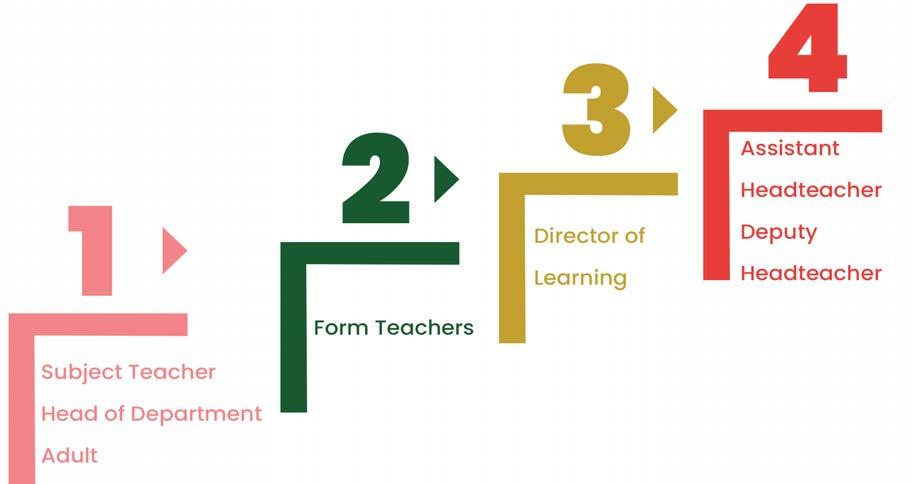
All incidents of bullying will be investigated thoroughly. If school suspects a bullying incident has taken place, pupils should expect any of the following sanctions: -
› Isolation at break and lunch
› Detention
› Withdrawal from school trips
› Monitoring by a pastoral leader
› Change of form group or class
› Involvement of external agencies
› Internal exclusion (Remove)
› Fixed period suspension
Arbor: All communication should be made through Arbor. Every effort will be made to respond to any communications as soon as possible, but no later than 5 school days.
Staff will not be expected to respond to communication from parents/carers outside their working hours (8.00am to 4.00pm)
Telephone calls: If parents/carers need to speak to a specific member of staff about a non-urgent matter, they should contact the school office and the relevant members of staff will contact them as soon as possible.
If the issue is urgent, parents/carers should call the school office. Urgent issues might include things like family emergencies, safeguarding or welfare issues.
For more general enquiries, please contact reception.
There may be occasions where parents disagree with a decision or action taken by the school. In these instances, it is essential that parents remain respectful when speaking with school staff and conduct themselves appropriately while on or around the school premises. It is important that all adults in our community set a positive example for our pupils and never act in a way that could threaten or frighten them. If such behaviour does occur, we will report the matter to the police for public disorder or other relevant concerns and request that action be taken to prevent it from happening again.
When parents have a disagreement with the school, we insist that concerns are raised professionally and respectfully. It is crucial that home and the school present a united front to pupils to maintain the respect and effectiveness necessary in a school environment. We kindly request that pupils are not present or exposed to any criticism of school procedures or staff, either at home or at the school. We are always happy to meet with any parent to have an open and honest conversation where both sides are listened to, with the aim of reaching an agreement that satisfies all parties.
Parents/Carers should be aware of the following:
Definitions
› The term ‘violence’, ‘aggression’ or ‘bullying’ as used in our Zero Tolerance Policy are defined as:Verbal abuse, in person or over the telephone which includes shouting, swearing and gestures.
› Actual or threatened physical assault on any member of staff of the school.
› If a member of staff receives an abusive telephone call, they should warn the caller that they will terminate the call if they do not modify their behaviour.
› If the caller continues to be abusive, or the tone of the call makes the member of staff feel uncomfortable, the call will be terminated without further warning.
› If an abusive incident occurs in the reception area, or another area of the school site, the perpetrator will be asked to leave the school site immediately.
› The police may be contacted if necessary.
› All incidents must be reported to the Headteacher or School Business Manager and details recorded.
› When a parent/carer is abusive towards a member of staff they will receive a letter outlining why this is not acceptable behaviour.
› In the event of actual or threatened violence, the police will be contacted.
› Under Section 576 Education Act 1976, there is no automatic right of entry onto school premises. The Headteacher reserves the right to withdraw permission for an individual to be on school premises and this will be put in writing.
If parents/carers would like to schedule a meeting with a member of staff, they should contact school through Arbor using the staff list. Meetings, if deemed necessary, will be scheduled within five working days of the request at a mutually convenient time.
In the first instance, pupils should try to resolve school issues by discussing them with the form tutor. If these discussions do not bring about a resolution, then parents/carers should then make contact with school using the details below.
All communications to school should go through Arbor. To ensure the correct person receives the correspondence, please refer to the appropriate person from the box below. Include pupil’s full name in the correspondence and the name of the appropriate member of staff in the main body of the text.
General pastoral issues which might include:
› Lost property
› Uniform issue
› Minor friendship issue
› Minor illness
› Homework issue
Director of Learning
More specific issues which might include:
› Bullying
› Progress and attainment
› Wellbeing
› Change in family circumstances
› Concerns about effort and attitude
› Major friendship issues
Issues that are related to specific lessons which might include:
› Homework concerns
› A concern over progress
› A classroom incident that requires clarification
› A classroom incident that requires investigation
› A request for additional information
Finance
Issues related to:
› Arbor payments
› School trips
› Catering issues
Pastoral Hub
Our pastoral hub is the heart of our school. It offers a range of support to pupils; a place where pupils find comfort and solace. It is a hive of activity because of the many services within it. Our pastoral team is housed here as well as our SENDCO. Another important part of the hub is the Inclusion Team. Their provision is extensive and they deliver services to pupils who have been identified.
Please contact the hub to relay information regarding:
› Lost property
› All medical issues including care plans, distribution of medicine and vaccinations
› Care Plans
› Toilet passes
› Nurse’s information
SENDCO
› Concerns with pupils who have been identified with educational needs.
› Concern with a pupil who may display SEND associated behaviours
› All serious complaints should be made by contacting the Headteacher’s PA in the first instance; or by using the Complaints Notification Form which is available via the school website
Attendance Officer
› Attendance issues – Send message via Arbor in the first instance. If this is not possible contact school via telephone (01942 725651) .
› Holiday Requests Form can be collected from reception or can be accessed via the school website.
› Medical appointments- pupils should bring medical evidence into school or have a note in planner from parents/carers requesting permission to leave school.
Inclusion
It is important to us that everyone in our community can communicate easily with the school. We currently make whole-school announcements and communications in English.
Parents/carers who need help communicating with the school can request the following support: -
› School announcements and communications translated into additional languages
› Interpreters for meetings or phone calls
We can make additional arrangements if necessary. Please contact the school office to discuss these.
In the event of a school closure, parents will be contacted email, X (Twitter) and the school website.
Inset Day Monday 1 September
Open Tuesday 2 September
Half-Term Close Friday 24 October
Re-open Monday 3 November
Close (Christmas) Friday 19 December (early finish)
Inset Day Monday 5 January
Open Tuesday 6 January
Half-Term Close Friday 13 February
Re-open Monday 23 February
Closed Wednesday 1 April
Inset Day Thursday 2 April
Bank Holiday Friday 3 April
Open Monday 20 April
Bank Holiday Monday 4 May
Half-Term Close Friday 22 May
Re-open Monday 1 June
Close Friday 17 July (early finish)
Our Home School Agreement contains information on the aims and values of St Edmund Arrowsmith Catholic High School and sets out what the school expect of all its pupils. Pupils are more likely to achieve their potential when schools and parents work together, therefore this agreement will help us to establish and maintain strong relationships between parents, carers and the school.
IMPORTANT NOTICE - Please inform us if you disagree with any of the information provided in this Family Handbook. If you do not contact us, we assume your acceptance of all information provided.
I/We will:
› See that my son/daughter goes to school every day, on time, in full school uniform and properly equipped to work hard in lessons.
› Make the school aware of any concerns or problems that might affect my son/daughter’s work or behaviour.
› Support the school’s policies and guidance for behaviour, attendance and uniform.
› Raise any concerns or complaints in a respectful manner and, if appropriate, through the school’s complaints procedures and will not bring the school into disrepute through any other media (social and journalistic).
› Track my child’s progress and implement suitable rewards and sanctions as appropriate.
› Support my son/daughter in completing their homework and encourage all opportunities to engage in home and independent learning.
› Attend all parents’ evenings and discussions about my son/daughter’s progress and communicate to the form tutor in the first instance any concerns or difficulties that affect their education.
› Talk to my child about their experience at school, opening conversations about their learning journey.
School
The school will:
› Make your son/daughter’s safety, happiness and educational achievement a priority.
› Challenge your son/daughter to achieve their full potential as a valued member of our school community.
› Provide an environment which is rooted in Gospel values that develops each pupil’s faith journey.
› Provide a broad and balanced curriculum and meet the individual needs of your son/daughter.
› Achieve high standards of work and behaviour through building good relationships and developing a sense of responsibility.
› Keep you informed about general school matters and about your son/daughter’s progress in particular.
› Be open and welcoming at all times and offer opportunities for you to become involved in the life of the school.
› Fulfil the aims of the school.
I will:
› Attend school every day and on time.
› Bring all the equipment I need every day.
› Wear full school uniform correctly and be tidy in appearance.
› Abide by the fundamental school expectations and be ready to learn, respectful and safe.
› Complete all my classwork and homework to the best of my ability.
› Be polite, courteous and helpful to others.
› Keep the school free from litter and graffiti.
› Not bring the school into disrepute via social media or poor behaviour in the community.
